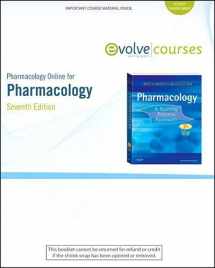
Pharmacology Online for Pharmacology (User Guide and Access Code): A Nursing Process Approach
Book details
Summary
Description
Pharmacology Online is a customizable hybrid online course, featuring user-friendly, ready-to-use modules and a flexible library of online assets. Organized by unit to match Pharmacology: A Nursing Process Approach, 7th Edition, this course includes interactive case studies that immerse you in true-to-life scenarios and challenge you to make critical choices in patient care and teaching. Self-study modules covering basic principles of pharmacology, durg calculation review, and key drug classes feature animations and quizzes, interactive learning activities for each unit, NCLEX® examination-style practice quizzes, electronic flash cards, and care planning activities. Plus, unique "Roadside Assistance" video clips use humor and analogy to bring difficult concepts to life. When used together, these engaging online study modules and interactive assets promote "learning by doing" and make it fun to learn nursing pharmacology.
- 21 self-study modules ― including 6 new to this edition ― cover both basic principles of pharmacology and key disorders and drug classes using illustrations, animations, integrated learning activities, and dynamic hyperlinks.
- Case studies with accompanying quizzes use true-to-life clinical scenarios to help you "learn by doing" in the safety of a virtual clinical setting.
- NCLEX examination-style practice quizzes for each unit offer valuable review and test preparation with 10 to 15 self-scoring questions and rationales.
- Interactive, game-like learning activities make it fun to test your knowledge of critical drug content.
- A collection of 16 unique "Roadside Assistance" video clips feature nationally known pharmacologist/speaker Alan P. Agins, PhD, who presents core pharmacology concepts with humor and analogy.
- Electronic flash cards provide a quick and easy way to memorize information about major drugs, drug classes, and pharmacologic principles.
- Care planning activities present brief case studies along with care plan templates that challenge you to use your pharmacology knowledge to plan patient care.
- Discussion questions facilitate virtual classroom discussions that are critical to learning in an online environment.
- Animations visually demonstrate and clarify complex concepts.
- An integrated drug handbook serves as a convenient reference and adds to the simulated, true-to-life clinical environment.
- An audio glossary presents both a definition and an audio pronunciation clip for approximately 1,400 terms and drug names.
- New organization strengthens the connection between the online course and the textbook by combining corresponding self-study modules, videos, and animations into folders that match up with each textbook unit.
- Dynamic new self-study modules go beyond basic pharmacologic principles to help you better understand key drug information related to areas such as HIV/AIDS, asthma, pain, peptic ulcer disease, antihypertensives, and antilipemic drugs.


We would LOVE it if you could help us and other readers by reviewing the book
Book review



